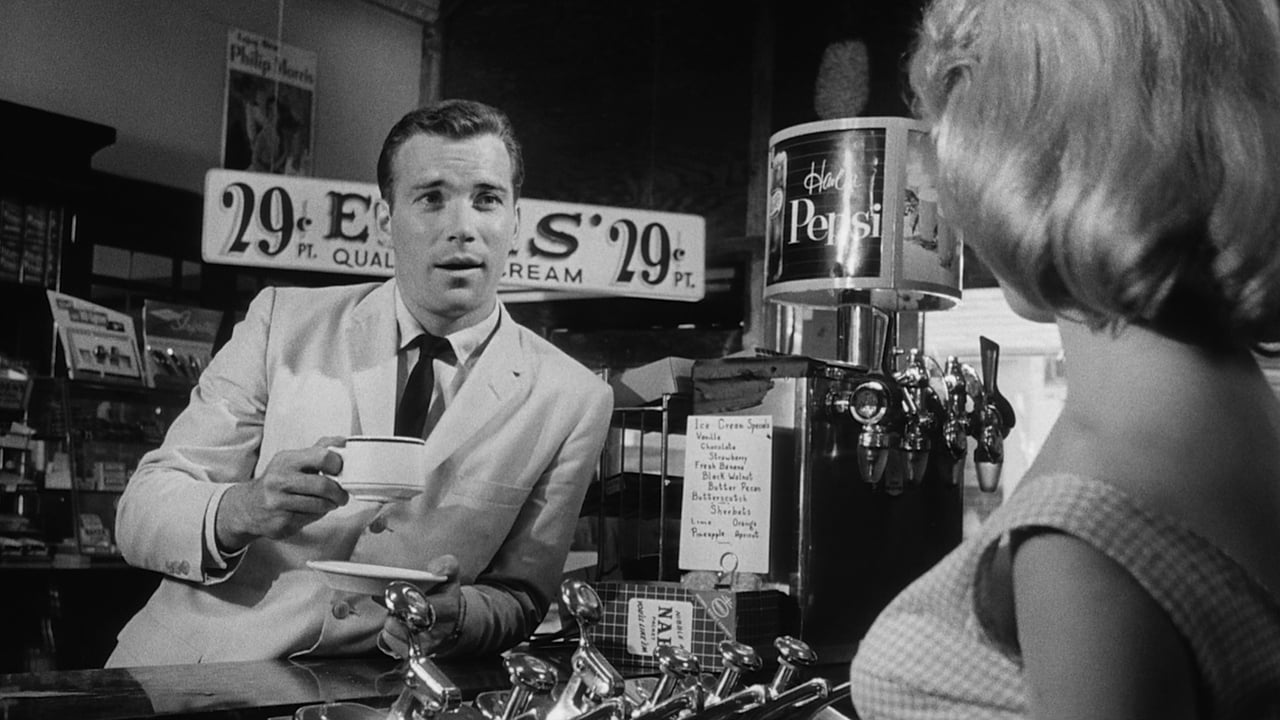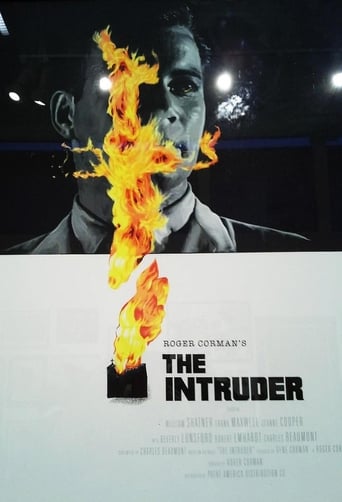WasAnnon
Slow pace in the most part of the movie.
Tacticalin
An absolute waste of money
Francene Odetta
It's simply great fun, a winsome film and an occasionally over-the-top luxury fantasy that never flags.
jadedalex
It is very little wonder that the Roger Corman production of 'The Intruder' is a very rarely seen 1962 film about integration in the South. The usually affable William Shatner plays a prototype David Duke character, he's even seen cavorting with KKK members in their motorcades.The dialog is full of words certainly too 'offensive' by today's PC standards. The dreaded 'n' word is repeated countless times. Along with 'jigs' and 'coons', the dialogue, though 'offensive' to today's ultra-hip millennials, is gritty and real for its time. I would suggest that 'The Intruder' is a very honest, hard-hitting film, where 'To Kill A Mockingbird' is sentimental and romantic. (I am quite aware that 'Mockingbird' is on so many people's 'favorite' lists. Excuse me.)Personally, I think this no holds barred story about the days of school integration is totally believable and I'm impressed with the fine screenplay of Charles Beaumont, who is more famously noted for his brilliant short stories and 'Twilight Zone' scripts. He has a small role towards the end of the film. As far as our beloved 'PC' world, the internet is a valuable tool for finding films of this ilk. For all I know, the movie may be available on DVD. But I personally had never heard of the title, and I'm familiar with much of Beaumont's and Shatner's work.It doesn't have a happy ending. Why would it?
Scott LeBrun
Adam Cramer (William Shatner) is a young man who arrives in the small Southern town of Caxton, wearing a white suit and a big smile. He claims to be a social worker, but is really a member of a very racist organization dubbed The Patrick Henry Society, which has made it its mission to fight the desegregation of schools. As we can see, Adam is a *beep* disturber par excellence, but there are a select few in town who eventually see through him, and realize that he's not capable of controlling a mob.Shatner does very well in this potent drama from producer / director Roger Corman, Cormans' brother Gene (who executive produced), and author / screenwriter Charles Beaumont. Beaumont was a prominent talent used by both A.I.P. studios and the 'Twilight Zone' TV series, and here he does a fine job of showing the hatred and ignorance of man. "The Intruder" is stark and effectively dramatic, with solid acting all around. Shatner is charismatic and convincing; ultimately we can see how at heart he's really a pathetic coward who will resort to desperate measures if he thinks that he's not getting his way.The supporting cast is noteworthy for including a couple of screenwriters. Beaumont also appears on screen as Mr. Paton, and George Clayton Johnson and William F. Nolan (who co- wrote "Logan's Run") and Leo Gordon ("Attack of the Giant Leeches", "The Wasp Woman") play area locals. Particularly good are Robert Emhardt as local bigwig Verne Shipman, Frank Maxwell as newspaperman Tom McDaniel, Charles Barnes as brave teenager Joey Greene, Mr. Gordon as salesman Sam Griffin, and Jeanne Cooper as Sams' wife Vi. Herman Stein composes the music, and Taylor Byars does the excellent cinematography.This was a rare attempt by Corman to create a Message Movie, and it's also one of the rare instances of one of his movies not being financially successful. It was reissued under other titles in the attempt to turn a profit. It's definitely deserving of another look.Eight out of 10.
lemon_magic
Although by modern dramatic standards "The Intruder" might be considered somewhat heavy handed and unrealistic (and the ending wraps things up in a tight little bow that might irritate people who have actually been through similar experiences), I was impressed by how edgy and upsetting this movie was.Shatner gives a hell of a performance here - kind of an anti-matter version of Burt Lancaster - and the role plays to his strengths. Having seen him in "Incubus" and a couple of Twilite Zone episodes, I knew he could carry a movie with the right part, and he is fascinating to see in action here.I also admit that the screenplay didn't aways go for the easy out - the hero turns out NOT to be the crusading newspaper man (who is indeed brave, but not especially effective in the end) but the seemingly thoughtless and one-dimensional "good old boy" salesman living in the hotel room right next to "Adam Cramer". And the climatic scene near the end where the young black man is seemingly about to by lynched from a swing set (!) does something else instead that made me whistle in admiration.Not perfect, but shows what Corman could have become if things had worked out differently.
OldAle1
Due to my overall ignorance of both Roger Corman's career outside of his usual horror/exploitation stuff, and William Shatner's outside of Captain Kirk, I'd never seen this 1962 racial drama, nor really even heard much about it until recently. But it's a film that seems to be growing in stature with the years, and after finally watching it recently, I can see why.Shatner is Adam Cramer, apparently a member of the Patrick Henry Society and a hard-core racist who shows up in a small Southern town that has quite recently been compelled by court order to integrate its high school. Cramer is, from his very first scene as he gets off a bus and takes a hotel room, here to sow the seeds of discord. The white townspeople of Caxton don't want integration, but they're more-or-less resigned to it, until Cramer shows up and tries to motivate them into resisting, apparently in as violent a way as they can without bringing the Feds down on them.Shatner is actually quite good in this role, relative low-key for the first quarter hour or so until he has made his presence known and makes an impassioned declamation from the courthouse steps to most of the whites about how their town, and eventually their state and the whole South will be delivered into the hands of the negroes if they don't resist - at this point and for most of the rest of the film he becomes the over-the-top Shat that we know and love, but it's probably appropriate here to the not-too-subtle screenplay and his rather strangely put together character. We get intimations throughout that he's mentally ill or at least emotionally unstable, and his wooing of both a very underage high school girl and his married neighbor shows that this is just as much a pleasure trip for him as anything else. We never really see any evidence in fact that he is who he says he is, and it might be wondered whether or not he's a member of the group he claims is funding him, or acting on his own. He seems to exhort violence, yet be upset when the townspeople resort to it without his say-so.It's not just in Cramer's psychology but also in that of the town as a whole that the film has problems, painting its citizens as essentially a mindless mob hell-bent on violence but able to just as easily be swayed by a couple of more rational voices (Frank Maxwell as newspaperman Tom McDaniel and Leo Gordon as cuckolded husband Sam Griffin) as by Cramer. Though the finale, where one of the black high school students seems about to be lynched through a deliberate smear on Cramer's part, is directed with punch and works on an emotional level, much of the story falls apart if you think too much about it.Still, all in all, this is one of the better racial dramas of the 1960s, fluidly and starkly directed by Corman in crisp black and white, with a very realistic feel and generally at least decent performances out of the large supporting cast, many of whom I'm guessing were nonprofessionals. Though the politics are blunt as a hammer, the blows are delivered more forcefully and articulately for my money than in most of the bigger films from later in the decade like "In the Heat of the Night". It's really a shame this film didn't have more of an impact when it was released. I guess we weren't ready for it...

